Вестник ВолГУ. Серия: История. Регионоведение. Международные отношения @hfrir-jvolsu
Статьи журнала - Вестник ВолГУ. Серия: История. Регионоведение. Международные отношения
Все статьи: 1894
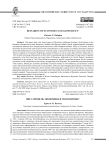
Bessarion on economics and geopolitics
Статья научная
This paper deals with those aspects of Byzantine intellectual heritage, which belong to the Bessarion’s thought and writing. Bessarion, Cardinal of the Roman-Catholic Church, proposed specific, systematic and analytical measures for a re-organization and recovery of the Despotate of Mistra, while, as it is known, he lived there from the end of 1431 until the end of 1436. Then Вessarion, in his capacity as cardinal, showed his continual and undiminished interest to the advancement of Greek nation, as proven by three famous memoranda of scholar. These are appeals to Constantine Palaiologos, Despot of Mistra, as well as to the doge of Venice. Dated July 13, 1453 the letter to the doge informed him on the Fall of Constantinople and the sufferings of Greek nation! Especially noteworthy is the third (and only surviving) letter of Вessarion, addressed to his friend, Despot Constantine Palaiologos in the spring of 1444. Here Вessarion proposes a specific, specialized program for the economic restructure, social reorganization and military strengthening of the Despotate. The intellectual associates education with economy. Sharing the economic philosophy of ancient Greeks on self-sufficiency and utilization of local means, Вessarion became a forerunner of mercantilism, while also acknowledging the productive contribution of education. The proposal of Вessarion for the transfer of the Despotate’s capital closer to the Isthmus was of great geopolitical importance since, when the guarding of the Hexamilion Wall would be reconstructed and constant and properly updated. These proposals, having been so important for the evolution of Byzantine economic thought, took an appropriate place in its development.
Бесплатно
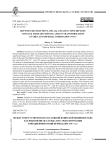
Статья научная
Introduction. As the title implies, the article describes the evolution of Cossack military service in the late imperial period, which was completed with the formation of Cossack military service, which existed without significant changes until 1917. Methods and Materials. The article is based on various papers: archival materials from the Russian State Military Historical Archive (Moscow), publications of contemporaries on Cossack issues of the second half of the 19th - early 20th centuries, published in the pages of the magazine “Military Collection.” The analysis of historiography on the topic capacitated the author to reveal an overall perspective on the content and evolution of the Cossack service from 1835 to 1917, which was detailed in the narrative acquiring a multi-level structure. In this framework, the emphasis is on the explanation of the relationship between the individual elements of the service over several decades. Analysis. For a long time, the form and content of Cossack military service were influenced by the geographical features of the location of a specific Cossack army, the theater of military operations, where Cossack units were used, military traditions, etc. After the Crimean War and with the end of hostilities in the Caucasus, and especially with the beginning of the epoch of “liberation”, the evaluation of the Cossacks and their service moved on to the press. The main platforms for the discussion of the Cossacks military and colonization functions were the periodicals subordinate to the War Ministry. Under the influence of D.A. Milyutin’s military reforms Cossack service was transformed, first on the basis of a conscription order, and then, with reference to the adoption of the general imperial Charter on military service (1874) it again acquired a mandatory character. Results. The article concludes that emerging in the late 19th - early 20th centuries the service system implied more rigid centralization and unification, and the entire policy of the War Ministryuntil 1917 in relation to the Cossack service was aimed at its maximum adaptation to the army regulations and the requirements of modern warfare.
Бесплатно
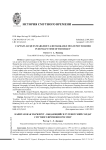
Captain jacques margeret: a remarkable huguenot soldier in Russia'S time of troubles
Статья научная
Captain Jacques Margeret (fl. 1591-1621), a brave and highlyintelligent French Huguenot soldier, was an active observer-participant in the Time of Troubles who contributed to Russia's military modernization. Margeret also wrote one of the most valuable foreign accounts of early modern Russia: Estat de l'Empire de Russie et Grand Duché de Moscovie (1607). In this essay, Chester Dunning surveys two hundred years of scholarship about Margeret and his famous book, and he lays the foundation for a more objective biography of the remarkable French captain who served Tsar Boris Godunov, Tsar “Dmitrii”, Tsar Vasilii Shuiskii, the Tushinite pretender Dmitrii, “Tsar” Wladyslaw, King Sigismund III of Poland-Lithuania, Prince Janusz Radziwiłł, and finally King Gustav II Adolf of Sweden. This essay challenges recent scholarship concerning Margeret's identity, his religious affiliation, his early career in France, his controversial career in Russia, his later career, and the composition of his book. This essay is based on fifty years of research by the translator of Jacques Margeret's book into English as The Russian Empire and Grand Duchy of Muscovy: A 17th-Century French Account (1983). In addition to reading most published sources and scholarship about Margeret and his account of Russia, the author has examined documents related to Margeret's biography in French, Russian, Polish, and British archives. In the process, Dunning discovered a letter Margeret wrote to King James I in 1612 encouraging English military intervention in north Russia to counter Polish and Swedish intervention.
Бесплатно
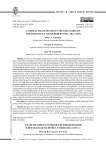
Catholic emancipation in the Great Britain and Irish policy of Sir Robert Peel (1812-1829)
Статья научная
Introduction. The subject of research in this work is a historical and historiographical review of the Irish policy of one of the Tory leaders, Sir R. Peel (1788-1850), from the moment of his appointment as Secretary for Ireland in 1812 to the political crisis associated with the Catholic Emancipation in 1829. The relevance of the work is determined by the fact that the Irish policy of R. Peel is investigated here not only in the traditional problem-chronological way but also in a biographical context.
Бесплатно
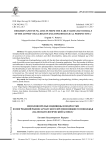
Статья научная
This paper presents the results of a study of bone remains of impuberal individuals from the Early Sarmatian burial mounds located in the Lower Volga region. When working with bone remains, we analyzed frequency of occurrence of various stress indicators and other abnormalities, taking into account biological age of the individuals buried there. The comparison of paleopathology results with the data from archaeological and ethnographic written sources made it possible to assess some aspects of the life of the early Sarmatian population. Thus, the number of children and adolescents in the early Sarmatian burials corresponds to the established paleodemographic standards proving the normal demographic situation in the paleopopulation. Reconstruction of nutrition patterns allows us to assert that breastfeeding in early Sarmatians was long. Meat and dairy products were the basis of the diet of both older children and adults. In the life of the population, there must have been occasional famine periods, for instance, due to livestock loss. The nomads' diet was limited to meat and milk products, did not provide proper nutrition and caused numerous diseases such as scurvy and porosis. Paleopathology data demonstrate the spread of helminthiases and various infections in the Sarmatians.
Бесплатно
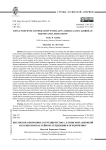
China’s defense cooperation with Latin America and Caribbean: trends and limitations
Статья научная
Introduction. China started to develop military-to-military ties and defense-industrial cooperation with Latin America and Caribbean countries in the early 2000s as an element of its strategy of comprehensive cooperation with the region. Defense cooperation was mentioned in the Chinese documents and statements on the policy in the region from the early 2000s. However, China has always considered this defense cooperation to be just a secondary, subordinate element of its overall strategy in the region.
Бесплатно
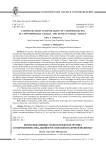
Communication technologies of crowdsourcing in contemporary global and russian public policy
Статья научная
Introduction. The paper studies crowdsourcing technologies of public communication that is an essential part of the global and regional contemporary political spaces as a method of nonviolent conflict resolution and reduction of social tensions in different parts of the world. Methods. The authors examine crowdsourcing technology of public political communication based on classical and modern concepts of political-communicative interaction of society and government (J. Habermas, M. Castells, G. Tarde, J. Shurovyeski, J. Howe). The paper reveals the specifics of implementation of crowdsourcing in the international public policy on the example of the United Nations Organization world agenda setting e-discussion projects, and in the political context of modern Russia with the spread of e-government practices, e-participation of individuals and groups. Results. The introduction of crowdsourcing is one of the important stages in the process of increasing the effectiveness of communication between government bodies, local authorities, business, political and public associations in developing and making the most important decisions for citizens all over the world. The demand for crowdsourcing in both international and Russian public policy is connected, on the one hand, with the recognition that a huge number of citizens have the abilities, talent, necessary competencies and qualities of innovative activity, and, on the other hand, with significance of development of ‘human capital’, understood as a set of knowledge and skills used to meet the diverse needs of citizens and societyas a whole, for the modern competitive and challenging world. Discussion. The limits of crowdsourcing technologyin public policy need to be evaluated from the perspective of social and cultural stratification and inequality, potential of mediated collective action.L.S. Pankratova has carried out complex analysis of the concept of public sphere in the context of new information communication technologies dissemination and examined the cases of crowdsourcing projects introduced by the United Nations Organization over recent years, as well as made professional translation of the article. S.V. Shakarbieva has conducted interdisciplinary analysis of social theories to interpret the concept of crowdsourcing and investigated the perspectives and limits of the spread of crowdsourcing communication technologies in the modern public policy space of Russia.
Бесплатно
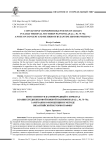
Статья научная
The paper endeavours to discuss anew a scholarlypuzzle related to the Croatian early Middle Ages and centred on a few lines from Constantine VII Porphyrogennetos’s De administrando imperio , which in English translation are as follows: And of the Croats who arrived to Dalmatia one part separated and ruled Illyricum and Pannonia. And they also had an independent ruler who was sending envoys, though only to the ruler of Croatia from friendship . Taking a different approach from the complete dismissal of the two sentences as a pure fiction or a mere literary device, the paper instead attempts to trace the concept behind this account as well as its underlying meaning. On the one hand, it seeks to detect the methods or strategies used by the royal compiler in trying to elucidate the past. On the other hand, it aims to provide a thorough historical analysis and offer a possible interpretation in opposition to the view, still largely extant in the Croatian scholarship, that this account is an evidence for an early presence of the group called Croats in southern Pannonia.
Бесплатно
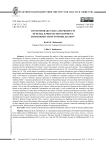
Contemporary state and prospects of female protest development: from deprivation to mobilization
Статья научная
Introduction. The article presents the analysis of the сontemporary state and prospects for the development of women’s protest in a global perspective. The research focuses on the study of the causes and nature of mass women’s protest in the context of the formation of a new system of relations between the authorities and society represented by certain social groups. The relevance of the problem is determined by the need for a political science analysis of modern practices, causes and forms of women’s protest, making a forecast of the prospects for the development of women’s social movements. Methods and methodology. The methodological basis of the research is the synthesis of the relative deprivation theory by T.R. Gurr and the resource mobilization theory by Ch. Tilly, which makes it possible to present women’s protest through the prism of both psychological (deprivation) and institutional determinants. The empirical basis of the work is the data (338 cases) of the quantitative study “The Women in Resistance (WiRe)”, that is available for secondary analysis in the Harvard Dataverse Repository. Analysis. Women’s protests represent an institutional and non-institutional form of changing the “political field”. A common peripheral role of women in the political space serves as a basis for the formation of a common identity among them. A high degree of consolidation, as well as an active role of women in protest, correlates with the success of collective action. Protests in which women play an active role are more peaceful in nature. This is due to the mediating role of women, which prevents the growth of tension in the conflict. Results. Based on the analysis of statistical information and case-study, it was revealed that the economic and legal structural similarity of states does not determine the nature of women’s protest participation in politics, which is more dependent on historical practices, previously achieved results of women’s protest, the presence of institutional structures that organize protests, as well as on the specific problems of women in the state. The prospects for the development of women’s protest and women’s social movements are determined by the level of success achieved. While in Western Europe and the USA, women’s social movements are fighting for the achievement of post- material values, due to the solution of the economic differentiation problems, in Latin America, women are fighting for their natural right to life and their own bodies. A vector of women’s protest is aimed at combating all types of discrimination, but the nature of specific problems is fundamentally different.
Бесплатно
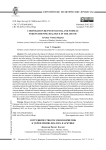
Cooperation between Russia and Norway: strengthening dialogue in the Arctic
Статья научная
This study analyzes the degree of influence of international tension due to anti-Russian sanctions on relations between Russia and Norwayat thegovernmental and regional levels, includingpolitical, economic, environmental, cultural, and other spheres. The authors begin by discussing how Norway's accession to anti-Russian sanctions and active involvement in NATO have affected bilateral relations, especially in the economic and political spheres. The presented work is based on the principles of historicism and objectivity. The methodological framework for writing the article is the model of neoliberal institutionalism and constructivism. The source base of the study, in addition to publications in periodicals, consists of official documents regulating the foreign policyactivities of Russia and Norway . The article attempts to structure the relations of the twoArctic neighbouring countries under new international conditions by highlighting two levels of interaction - governmental and regional - as well as critical elements, including issues of economic cooperation, mutual sanctions, cooperation in the field ofenvironmental protection and fisheries, cooperation between the two countries in Spitsbergen, cooperation in science, culture, and education; and regional cooperation between Russia and Norway in the North and the Arctic. The article discusses to what extent security issues affect the development of the Russian-Norwegian dialogue in using the NSR as a transport route and problematic issues around Spitsbergen. Finally, the authors consider what practical measures are being taken by Russia and Norway to mitigate the general international tension in the bilateral dialogue using public diplomacy in the framework of strengthening and expanding contacts through the Barents Cooperation and interaction at the level of municipalities as well as universities in Russia and Norway. The authors conclude that notwithstanding geopolitical tensions, regional cooperation due to common borders, cultural and historical heritage, and the geo-economic relationship could be the primarydrivers for the revival of ties between the two countries. Authors'contribution . Jawahar Vishnu Bhagwat developed the concept of the study and worked out its theoretical and methodological foundations. I.V. Rogachevanalyzed the policies of Russia and Norway in various areas of bilateral cooperation and formulated the final conclusions.
Бесплатно
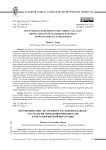
Статья научная
Introduction. The article studies extremism in the North Caucasus and analyzes the subjects, sources, and main reasons for the escalation of armed violence and radicalization. The author focuses on examining the Russian experience of regional policy, which made it possible to move in the North Caucasus from a strategy of conflict management and forceful measures to counter terrorism and extremism to post-conflict integration. Literature review. The author discusses empirical and theoretical sources relevant to the topic and objectives of the study. Methods. The article uses the method of qualitative diachronic analysis based on the collection and interpretation of data obtained from official documents and secondary sources. Analysis. Although transnational Islamist groups share common goals of global jihad and Islamization, they may differ in discourses and methods that facilitate the indoctrination of extremist ideas in the North Caucasus, which is why Russia since the mid-1990s has been using force against jihadism at its local and regional levels. To reduce radicalization and strengthen the integration of Muslims into Russian society, a conflict management strategy was adopted, including anti-terrorist operations; diplomatic efforts in the Muslim world to optimize Russia’s multi-confessional image; and a large-scale policy of supporting Russian Muslim leaders and their traditional communities. Domestic policy proclaims Islam to be a traditional religion protected by the state and foundational to the identity of the multinational Russian people. Results. The current integration policy in the North Caucasus serves as a tool for countering and preventing extremism – proactively influencing the factors and conditions of radicalization through a set of measures aimed at forming regional elites, economic support via interbudgetary transfers and development programs, promoting tolerance and inclusion, and organizing informational activities.
Бесплатно
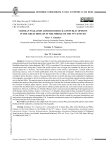
Статья научная
Introduction. The key issue of this work is the relationship between the press, public opinion, and political institutions of Great Britain during the Crimean War (1853-1856). In this context, the political activity of the Sheffield radical John Arthur Roebuck (1802-1879) is considered. The relevance of the work is determined by the research thesis that, during the Crimean War, public opinion was no longer only broadcast by the press but was largely shaped by it.
Бесплатно
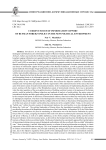
Current issues of information support of Russian foreign policy in the new political environment
Статья научная
Introduction. In the context of growing anti-Russian information wars, intensive and sharp ideological confrontation active information support of Russia’s foreign policy becomes more and more crucial. Methods. Authors use mainly the methods of expert evaluation and trends, opinion polls to prove that the US has long been waging information wars against Russia first using the term (“information war”) back in 1992. Moreover, with time the United States makes the methods of struggle more and more sophisticated and has already attracted the EU and NATO as associates. In addition, the methods of comparative analysis of research results of leading domestic and foreign experts in the field of information and ideological component of modern international relations and issues of information support of foreign policy of the Russian Federation, as well as general scientific and special methods of knowledge of legal phenomena and processes made as the object of the research: the method of systematic and structural analysis, comparative legal and formal-logical methods have been used. Analysis. Along with the tools of public diplomacy our state takes all the needed measures to defend its information sovereignty at all levels. Despite the fact that the Russian state strategy has consistently created a system of detecting, preventing and eliminating threats to its information security, still it is necessary to deal with ever growing amount of anti- Russian false information in the global media space. Results. Being one of the instruments of public diplomacy and foreign policy of any sovereign state, soft power takes into account the objective conditions of international relations and world politics and proceeds from the requirements of the national interests of the state as the main actor of the entire system of modern international relations. In the world practice of implementing the policy of soft power, starting with the creation of the Westphalian system of international relations, there was no precedent, when the state regardless of the socio-political nature of building a political system or the purposes of the foreign activity would be guided by different objectives and methods of analysis of world politics, the entire system of international relations and other goal-setting action in the international arena, including defined in the last decade by the concept of soft power. In the history of international relations, there has not been any world policy free from its ideological component. The thesis of de-ideologization of international relations, which received its definite distribution in the period immediatelyafter the collapse of the Soviet Union, in the practice of foreign policy actions of all the main actors of modern world politics has clearly proved its complete failure. Today, in the context of “hybrid wars” within the entire system of international relations, the world politics is no less ideologized than during the “cold war”. The political leadership of Russia allows the hypothetical possibility of cyberwarfare, provoked by the actions of the Republican administration of the United States. In December 2019, the White House authorized the preparation of a plan for conducting an information war with the Russian Federation by special forces of the U.S. Army, assigning the solution of this task to the above-mentioned cyber command. The policy of soft power of Russia, as well as its public diplomacy, as the whole complex of foreign policy activities of the Russian Federation in the international arena, is derived from the fundamental function of defending the national interests of Russia in the new political reality. The Russian Federation has consistently opposed the transformation of international relations into an arena of ideological confrontation with the use of tools of the so-called “information wars”. State sovereignty is unified. Information security, as a factor of ensuring information sovereignty, is a basic component of the unified state sovereignty. This is an accepted truth underlying the understanding of the nature of modern international relations, the principle underlying the foreign policy activity of any modern sovereign state, due to the objective regularity of the growth of the ideological factor of modern international relations. Moreover, in the face of targeted misinformation Russia needs to ensure its information security at both levels: political (ideological) and technical (technological) ones combining cyber as well as soft power tools. Only such a combination of these two crucial elements and continuous improvement can lead to victory in hybrid wars.
Бесплатно
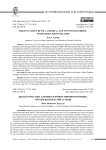
Debates about Russia, America, and new world order: four books from the 1850s
Статья научная
Introduction. The first major crisis of the international relations system founded in Vienna after Napoleonic wars emerged with the series of European revolutions of 1848-1849 and Crimean War of 1853-1856. Not onlydiplomatic alliances required to be re-evaluated, but also politicians and thinkers challenged the philosophical foundations of the world order. As Russia was the guarantor of the old system, and the United States appeared as an attractive model for the European revolutionaries, the debate on the new world order involved re-assessment of the two countries respective roles and of their future relations. Methods and materials. The article examines books on the subject written during 1850s by four prominent thinkers: American aspiring politician Henry Winter Davis, Russian diplomat Alexei Evstafiev, Polish émigré and American journalist Adam Gurowski and Russian political émigré Ivan Golovin. Analysis. They provided four different visions of the future of the world, and, while never mentioning each other, produced a polyphonic sound of the important debate on the eve of the American Civil War. Results. Bipolarity of the international system predicted by Davis became a fact only a century later, while criticism and praise to American role as a model and an intervening power in European affairs became a constant feature of any subsequent debate.
Бесплатно
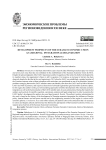
Development propsects of the Eurasian Economic Union as a regional integrational organization
Статья научная
Introduction. It has been almost thirty years since the idea of forming Eurasian space was voiced and seven years since that idea was embodied in the establishment of the Eurasian Economic Union (EAEU). Despite the acknowledgment of the EAEU importance and the recognition of the need of its further development by its member states, the organisation’s future is still in question. For instance, an increase in barriers has been observed, despite the fact that at the very beginning in 2015 when the EAEU was established, a gradual creation of the Eurasian customs union without exceptions and restrictions was proclaimed as one of its principles. Internal problems emerging between the EAEU member states considerably slow down the EAEU activity both within the EAEU and with its partners, and require a discussion of a broader agenda that goes beyond the economic sphere. In this regard, the authors set the goal of researching approaches to further development of the Eurasian economic integration as well as the harmonization of the EAEU member states in socio-cultural area. During the research, the authors used methods of scientific cognition, consistency, analysis and legal comparison. In order to examine the EAEU bodies’ development the authors also used legal research. Results. The authors’ position substantiated in the work is based on the history of the development of Eurasian economic integration, the influence of foreign policy, internal factors and soft power carried out by the neighboring countries of the region in various socio- economic spheres. Conclusions. As a result of the research, the authors come to the conclusion that it is necessary to restore and deepen cultural and historical ties between the participants of the Eurasian Economic Union, as a separate area of activity of the Eurasian Economic Commission.
Бесплатно
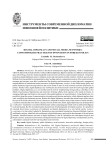
Digital diplomacy and social media networks: contemporary practices of innovation in foreign policy
Статья научная
Introduction. The article is devoted to contemporary digital diplomacy, which is implemented within the framework of social networks. Unlike traditional diplomacydigital one operates in a different communicative space where blogs, electronic media and global social networks are the key communication channels. Using these tools allows digital diplomacyactors to influence events and communities in other countries. Methods and materials. Method of mixing qualitative and quantitative data, hashtag-analysis, comparative analysis of the social networks’ messages and accounts were able to understand the dynamics and interactions in social networks, engagement and possibilities of institutional and private actors in digital diplomacy. Analysis. In the 2000s foreign policy and public diplomacy began forming based on data on the mood of users of social networks and their preferences in politics. Thanks to this, digital diplomacy may well become one of the innovative tools for resolving modern global problems. Digital diplomacy, as a new method and the tool for implementing foreign policy, contributes to the effective functioning of departments and ministries of foreign affairs, their response to the needs of citizens, to emerging challenges and threats to state security, like a global epidemic or natural disasters. Using digital tools, it is possible to shape the norms of communication, interaction and decision-making by which diplomats perform their work, modifying the diplomatic process. Besides this digital diplomacy increases the attractiveness of the state in the eyes of the world community. Results. Based on a comparative analysis study of the content of social networks, it could be concluded that over almost a decade, from the 2010s to the 2020s, digital diplomacy has developed from a “soft power” mechanism to a method of information warfare and propaganda which involves artificial intelligence tools and big data. But this is predominantly characteristic of technologically developed countries. It is possible to conclude about future co-existence of traditional and digital diplomacies in a new hybrid variety. Authors’ contribution. In this article Liudmila M. Reshetnikova has contributed Introduction, Research Methods, Analysis and Results sections: identified risks and threats to digital diplomacy, analyzed the development of the soft power methods, identified features and tools of digital diplomacy. Irina M. Samokhina has contributed Analysis and Results sections: analyzed social networks and digital infrastructure for digital diplomacy and diplomatic activity, contemporary computer tools for learning about social networks.
Бесплатно
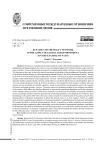
Dynamics of the policy network in the aspect of global crisis phenomena (on the example of NATO)
Статья научная
Introduction. A peculiarity of modern political reality is the interconnectedness of the processes of globalization and fragmentation in the world. In a new emerging paradigm of international relations, policy networks come to the fore. These are the network structures for managing public affairs, uniting a variety of political actors. The relevance of the study is due to the need for an objective evaluation of the development of the policy network in the context of global changes as well as forecasting potential threats in the field of international security. The aim of the work is to examine the dynamics of the policy network in the context of global crisis phenomena, using the example of the North Atlantic Treaty Organization.
Бесплатно
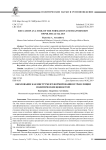
Education as a tool of the formation and transmission of political values
Статья научная
The political culture of any society is supported and determined by the spiritual and moral values adopted by this particular society over the course of its historical development. We can say that general cultural values of the metaphysical order eventually transformed into socio-political values that formed the modern heterogeneous political space. The transmission of values, including political ones, takes place by means of exploiting different mechanisms by society and using different tools. Nevertheless, one of the most effective mechanisms at this time is education, which is more and more often considered by developed countries as a means of achieving their economic and political dominance in the international arena. In this aspect, education serves as a tool of “soft power” policy. It is through the expansion and spread of their education model that many countries promote their political values in economically and geopolitically important regions.
Бесплатно
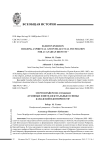
Egerton Ryerson: building a spiritual and intellectual foundation for a Canadian identity
Статья научная
The article analyses the philosophical and political theories of Egerton Ryerson (1803-1882) - one of the leading figures of intellectual history of Canada in the 19th century. The authors concentrate their research on the religious, political and educational activity of Ryerson,on his vision of good government and reform of educational institutions in Upper Canada. Special features of the Scottish Enlightment are discribed as well.
Бесплатно


